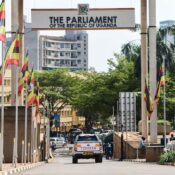
Tanzania is accused by Rwanda of obstructing its milk exports
The trade of dairy goods has become a point of contention between Rwanda and Tanzania. Kigali claims that Dodoma is preventing its milk exports notwithstanding a January agreement.
The business sector brought up a number of trade hurdles during a roundtable last week in Rwanda between the CEOs of the East African Business Council and the Secretary-General of the East African Community (EAC).
They informed Secretary-General Veronica Nduva that Tanzania continues to impose additional non-tariff barriers (NTBs) by means of the various agencies requesting charges that are in violation of the Common Market and EAC Customs Union regulations.
According to Abdoul Ndarubogoye, president of the Long-Distance Truckers Association, “the most important one we discussed during that roundtable meeting is on the issue of segregation, especially used as a weapon on unfair competition.”
You are unable to pay the high tax that our neighbors imposed on milk exports. They demand payment of a fee that is greater than the cost of the milk.
This occurs as Kenya and Uganda are still at odds over Nairobi’s blocking of Brookside Uganda milk.
According to traders, milk shipped to Tanzania is subject to a number of fees that are gathered by several organizations, such as the Tanzania Dairy Board, Tanzania Bureau of Standards, and Tanzania Foods and Drugs Authority.
According to Tanzania’s Animal Diseases and Animal Products Movement Control Regulations, which were released on August 31, 2018 (Government Notice No. 476), Dodoma now charges Tsh2,000 ($0.73), instead of Tsh150 ($0.055), for the importation of one kilogram of milk. Rwanda finds it challenging to sell milk or its products to its southern neighbor as a result of this 1,233 percent increase.
Mr. Ndarubogoye grumbled, “There are too many NTBs, but a lot of Rwandan milk is exported to the northern part of Tanzania.”
Tanzania produced 3.6 billion liters of milk in fiscal 2022–2023 compared to 3.4 billion liters in fiscal 2021–2022, a five percent rise, according to government figures. However, 12 billion liters are needed, thus imports are required.
In 2023, Rwanda produced a billion metric tons of milk.
The vice-chairperson of the EABC, Dennis Karera, stated that the new NTBs had an effect on intra-EAC trade and advocated for increased investment and trade among EAC member nations.
In the last three years, Kenya has prohibited Brookside from exporting into its borders, and Uganda has increased its milk production as well.
It has been alleged that the Kenya Dairy Board (KDB) selectively approves the paperwork needed to get goods onto the Kenyan market.
KDB has been accused of refusing permits for Brookside brands, whereas Ugandan milk brands like Lato and Dairy Top are able to cross the border with ease. The issue has not yet been resolved by bilateral negotiations.
Corruption on East African routes was another complaint made by Rwandan carriers.
“The road toll is not consistently applied. “The trailer and its head are subject to unfair road toll charges,” Mr. Ndarubogoye stated. “Rwandan trucks, particularly those that use the Mombasa-Taita Taveta route and the Central Corridor, are subject to arbitrary levies, such as requiring certificates on the truck or its contents.”
The EAC should be promoted as a single trading area by the corporate sector, Ms. Nduva advised.
The liberalization of air transport services, logistics and transportation, manufacturing, tourism, and the flow of services and service providers were the subjects of other talks.
These included the East African Payments System, the One Tourist Visa, the digital economy, energy, road-user fees, discriminatory levies and tariffs, work permits, the One Tourist Visa, and the upgrade of transportation networks.
All Categories
Recent Posts
Tags
+13162306000
zoneyetu@yahoo.com



